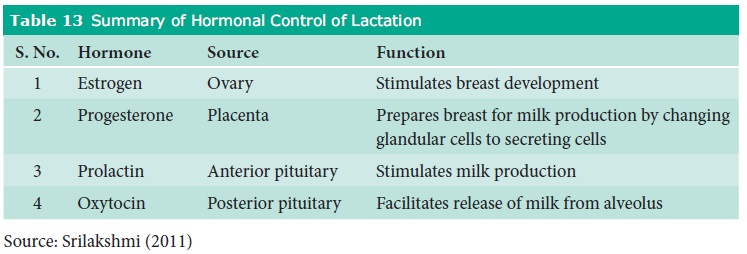Chapter: 11th Home Science : Chapter 6 : Family Meal Management
Nutritional Requirements of Pregnant and Lactating Women
NUTRITIONAL REQUIREMENTS OF PREGNANT AND
LACTATING WOMEN
Nutrition requirements increase
tremendously during pregnancy and lactation owing to the physiological
changes.
Wholesome nourishment before pregnancy has a greater
impact on the long term health on the mother and foetus. A well nourished
foetus enters life with good physical and mental health.
Physiological Changes in Pregnancy
Foetal development is accompanied by many physiological,
biochemical and hor-monal changes which influence the nutri-ent needs and the
efficiency with which the body utilizes them. The changes include
i. Increased basal metabolic rate (BMR)
Due to foetal growth the BMR increases.
ii. Gastro intestinal changes
Gastro intestinal motility diminishes which may result in
constipation.
iii. Hormonal changes
During pregnancy there is increased secretion of the
following hormones: i) Aldosterone ii) Progesterone iii) Thyroxin iv)
Parathormone.
iv. Changes in body fluid
The blood volume expands by 50 per-cent and this increased
amount of blood is required to carry nutrients to the foe-tus and remove
metabolic wastes from the foetus.
v. Altered renal function
Increased blood volume and increased production of waste
products like creati-nine, urea and other wastes due to foetal and maternal
metabolism produces a high glomerular filtration rate (GFR).
vi. Weight Gain during Pregnancy
Less than half of total weight
gain resides in the foetus, placenta and amniotic fluid. Women with desirable
body weight is 12.5 kg ranging between 11-13 kg.
Nutritional Needs during Pregnancy
In addition to the RDA for an adult women the
nutritional needs increase during pregnancy.
Energy
Energy requirement during pregnancy is
increased because of the additional energy required for growth and activity of
foetus, growth of placenta and maternal tissues, increase in maternal body size
and steady rise in BMR.
Protein
An additional protein intake is essential for:
–
Growth of the foetus.
–
Development of placenta
– Enlargement of uterus, mammary glands
–
Increased maternal blood volume
–
Formation of amniotic fluid
Fat
ICMR expert committee has suggested an intake
of 30g of visible fat/day during pregnancy.
Calcium
Additional calcium is needed for the growth
and development of bones as well as teeth of the foetus and also for the
pro-tection of calcium resources of the mother to meet the high demand of
calcium dur-ing lactation.
Iron
The requirement of iron increases from 21mg/day
to 35mg/day during pregnancy.
The increased requirement is due to
i.
expansion of maternal
tissues including red cell mass, iron con-tent of
placenta and blood
loss during parturition.
ii. to build the iron store in foetal liver to
last for at least 4-6 months after birth. This is because the baby’s first food
milk is deficient in iron.
Iodine
Due to increase in BMR, iodine needs are also
enhanced during pregnancy.
Zinc
Deficiency of zinc adversely affects the
outcome of pregnancy. Zinc deficiency leads to foetal mortality, foetal
malfor-mations and reduced intra uterine growth rate.
Sodium
Normal sodium intake without restric-tion is
advised during pregnancy. Sodium is restricted when there is oedema or
hypertension.
Vitamins
An additional allowance of Vitamin A is needed
during pregnancy. Vitamin D is essential as it enhances maternal calcium
absorption. Vitamin K is required for syn-thesis of prothrombin which is
essential for normal coagulation of blood. A liberal vitamin K level in the
mother’s blood is helpful in preventing neonatal haemor-rhage. Vitamin C,
pyridoxine, and vitamin B12 needs are increased during pregnancy.
Folic acid
Folic acid is essential for increased blood
formation i.e. haematopoiesis and for synthesis of essential components of
DNA/RNA which increase rapidly during growth.
Problems during Pregnancy
·
Nausea and vomiting
·
Constipation
·
Heart burn
·
Oedema and leg cramps
·
Pica
·
Anemia
·
Pregnancy induced hypertension (PIH)
·
Gestational diabetes
Lactation
Adequate nutrition for the mother during
lactation is also of vital importance as the infant is dependent on mother’s
milk for its nutrition for the first few months of life. Inadequate nutrition
during lactation is reflected on both the quality and quan-tity of milk
secreted.
Physiology of lactation
The Table 13 below gives the summary of
hormonal control of lactation.
Nutrient Needs during Lactation
ICMR nutrient recommendations for a lactating
mother are based on the com-position of breast milk and the fact that 850 ml of
milk is produced daily. However, the milk secretion continues to increase in
the early periods of lactation up to six months and then gradually decreases.
Therefore the nutrient requirements are given for the two periods in lactation
i.e. 0-6 months and 6-12 months.
Energy
The lactating mother requires additional
energy for the production of milk. Based on the optimal output of 850 ml/day,
the additional allowance is recommended during first six months of lactation.
Protein
Due to production of milk, protein requirement
also increases.
Fat
The total fat in breast milk is not
influ-enced by the mother’s diet. The fat also provides energy density to meet
the higher energy requirement during lactation.
Calcium
The requirement for calcium doubles dur-ing
lactation.
Iron
Since most mothers have lactational
amenorrhea, it results in saving of nearly 1mg iron per day which otherwise
would

Vitamins
The additional need of vitamin A during
lactation is based on the amount secreted in the mother’s milk. As the calorie
and protein requirements increase during lac-tation, the requirements of B
vitamins also increase correspondingly. Ascorbic acid content increases during
lactation.
Galactogogues
Galactogogues are foods that help to pro-duce
more milk. Garlic, milk and almonds are considered to increase milk
pro-duction. Studies carried out on nursing mothers have revealed that extra
amounts of body building foods like fish and mut-ton increase the secretion of
breast milk. Lactating mothers are also given special preparations containing
ajwain and fen-ugreek seeds, which supply iron, protein, calcium and B- complex
vitamins.
Related Topics